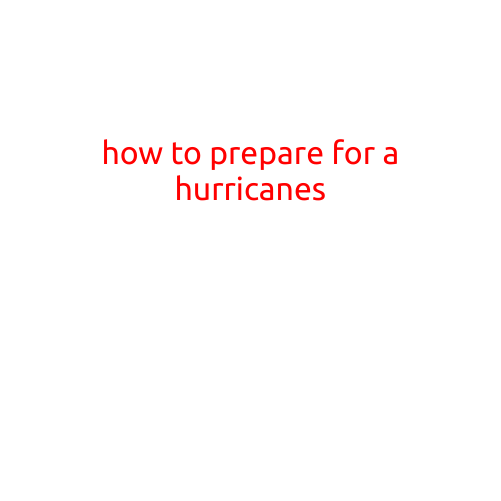
How to Prepare for a Hurricane
Hurricanes can be devastating natural disasters that can bring significant damage, destruction, and loss of life. However, with proper preparation, you can minimize the impact of a hurricane and ensure your safety and well-being. In this article, we will provide you with a comprehensive guide on how to prepare for a hurricane.
1. Create a Hurricane Survival Kit
A hurricane survival kit should include essential items that will help you and your family stay safe and comfortable during and after the storm. Some of the essential items to include in your kit are:
- Water: at least one gallon per person per day for drinking, cooking, and hygiene
- Non-perishable food: canned goods, energy bars, and dried fruits
- First aid kit: bandages, antiseptic wipes, pain relievers, and any prescription medications
- Flashlights and extra batteries
- Battery-powered radio and/or a NOAA Weather Radio
- Whistle to signal for help if needed
- Moist towelettes, garbage bags, and a portable toilet (if needed)
- Important documents: insurance policies, identification, and birth certificates
- Cash and credit cards
2. Stay Informed
Stay informed about the storm by monitoring weather reports and warnings issued by local authorities. You can also follow these steps:
- Sign up for emergency alerts and notifications from your local government or weather service
- Keep a battery-powered radio with you in case the power goes out
- Check the National Hurricane Center (NHC) website for updates on the storm’s track and severity
- Follow evacuation instructions from local authorities if ordered to do so
3. Protect Your Home
Take steps to protect your home from damage caused by high winds and flooding:
- Board up windows and doors with plywood or shutters to prevent damage and debris from entering
- Trim or remove trees and shrubs that could cause damage or block escape routes
- Bring outdoor furniture, decorations, and other items that could become projectiles in high winds
- Consider installing storm shutters or impact-resistant windows
4. Plan for Power Outages
Power outages are common during hurricanes. Plan ahead to ensure you have alternative lighting and cooling:
- Charge your electronic devices and equipment in case the power goes out
- Keep flashlights and extra batteries on hand
- Consider purchasing a portable generator or backup power system
- Have a plan for cooling your home, such as a portable air conditioner or evaporative cooler
5. Plan for Evacuation
If you are ordered to evacuate, have a plan in place:
- Know the evacuation route and emergency shelters in your area
- Gas up your vehicle and have a full tank of gas
- Bring essential items, such as medications, identification, and important documents
- Stay away from flooded areas and avoid traveling during extreme weather conditions
6. Prepare Your Vehicle
Make sure your vehicle is ready in case you need to evacuate or travel during the storm:
- Fill up your gas tank to ensure you have enough fuel to travel
- Check your vehicle’s maintenance, including the oil, tire pressure, and brakes
- Keep your vehicle in good working condition by performing routine maintenance
- Keep a emergency kit in your vehicle, including items such as jumper cables, flashlight, and first aid kit
7. Stay Safe During the Storm
Remember to prioritize your safety during the storm:
- Stay away from windows, doors, and exterior walls
- Avoid using electrical appliances or using fire, as this can trigger a power outage or spark a fire
- Stay informed about the storm’s progress and any updates from local authorities
- Avoid traveling or attempting to enter flooded areas
8. Plan for After the Storm
Plan ahead for the aftermath of the storm:
- Have a plan for securing your home, including boarding up windows and doors
- Bring out floodlights and extra batteries to help with cleaning and recovery
- Have a plan for retrieving food, water, and other essential items
- Consider hiring professional cleaners and contractors to help with cleanup and repairs
By following these steps, you can minimize the impact of a hurricane and ensure your safety and well-being. Remember to always prioritize your safety and the safety of those around you.





